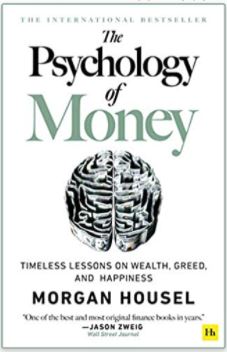
Psychology of Money (Morgan Housel) – Brief Book Review (February 2020)
Morgan Housel’s “Psychology of Money” is easy to read and typical to his style in sharing his point of view through specific stories. This is a compact book on behavioral finance; however, not relying on new ground. One of the main themes is that financial success is not a hard science that relies on complex math-based skills. It is a soft skill where success relies more on our behavior than what we know. He explores behavioral biases humans have when it comes to money, overreliance on studying extreme examples of success and failure, how humans assess risk, and several others.
The stories are meant to re-enforce the role our behavior plays in investment and life success and outlines ways we can better frame decisions we make. Some of the more useful discussions were discussions on compounding, “The first rule of compounding is to never interrupt it unnecessarily.”; the role that “tails” play in outcomes, “Tails drive everything.”; and timely, “Bubbles form when the momentum of short-term returns attracts enough money that the makeup of investors shifts from mostly long-term to mostly short-term.” Also, what we learn when we are surprised by something, we want to make sure we don’t repeat that “mistake”. However, “…the world is difficult to anticipate. That’s the correct lesson to learn from surprises: that the world is surprising. We should use past surprises as an admission that we have no idea what might happen next.”
Overall, there is no new material in this book. However, Morgan does a great job of breaking down some of the key behavioral limitations all people face and how we can make better decisions in regard to investing, saving, and succeeding. This is a great book also for a teenager or those just learning about finance/investing.